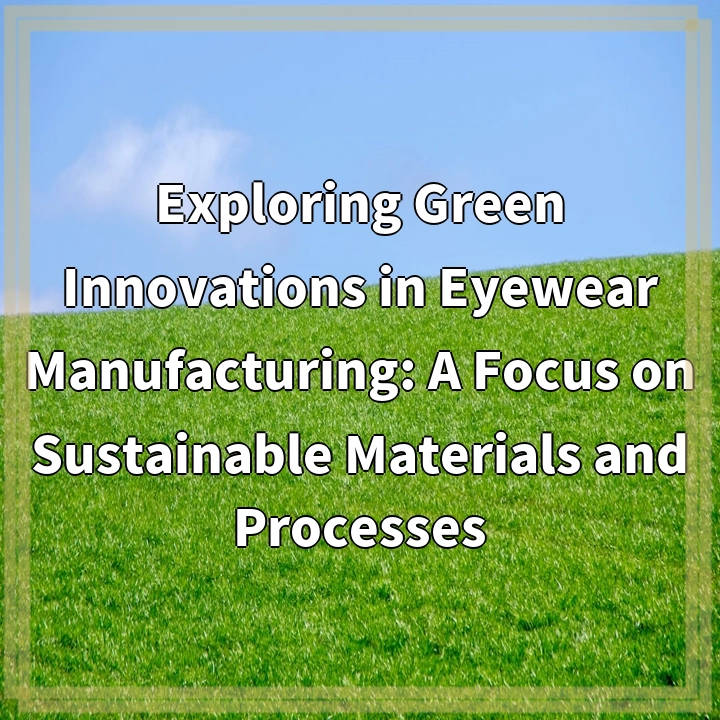
What it is:
Eyewear manufacturing is constantly evolving, and with increasing concern for environmental sustainability, the industry is now focusing on green innovations. These innovations aim to address the environmental impact of traditional eyewear manufacturing processes by adopting sustainable materials and practices.
Sustainable materials used in the production of eyewear include bio-based plastics, recycled materials, and natural fibers such as bamboo or wood. In addition to materials, greener manufacturing processes involve energy-efficient production techniques, waste reduction, and responsible sourcing.
The adoption of such green innovations in eyewear manufacturing not only helps reduce the environmental footprint of the industry but also provides consumers with eco-friendly and socially responsible alternatives.
Real-world problems:
The traditional eyewear manufacturing industry faces several environmental challenges. Some of the key problems include:
1. Carbon footprint:
The production process of conventional eyewear involves significant energy consumption, leading to a high carbon footprint. This contributes to climate change and global warming.
2. Waste generation:
The production of eyewear generates a substantial amount of waste, including plastic offcuts, packaging, and discarded frames. This waste often ends up in landfills, taking years to decompose and contributing to pollution.
3. Use of non-renewable resources:
Traditional eyewear manufacturing relies heavily on the use of petroleum-based plastics that are derived from fossil fuels. This depletes finite resources and increases reliance on non-renewable energy sources.
4. Harmful chemicals:
The manufacturing process of eyewear involves the use of chemicals such as solvents, dyes, and coatings, which can be harmful to both workers and the environment if not handled properly.
5. Limited recycling options:
Conventional eyewear materials, such as mixed plastics, are difficult to recycle due to their composition. This results in a limited recycling infrastructure and a significant amount of eyewear ending up in waste streams.
Recognizing these real-world problems, the eyewear industry is now actively seeking and implementing green innovations to minimize its impact on the environment.

Solutions:
Addressing the environmental problems associated with eyewear manufacturing requires the adoption of green innovations and sustainable practices. Some of the solutions include:
1. Embracing sustainable materials:
Manufacturers are exploring the use of sustainable materials such as bio-based plastics, recycled materials, and natural fibers. These materials have a lower environmental impact compared to traditional petroleum-based plastics used in eyewear production.
2. Implementing energy-efficient manufacturing processes:
Manufacturers are investing in energy-efficient technologies and production processes to minimize energy consumption and reduce carbon emissions. This includes using renewable energy sources, optimizing equipment, and implementing efficient heating and cooling systems.
3. Practicing responsible sourcing:
Eyewear manufacturers are focusing on responsible sourcing by selecting suppliers who adhere to sustainable and ethical practices. This ensures that materials are sourced in an environmentally friendly and socially responsible manner.
4. Reducing waste and promoting recycling:
Companies are implementing waste reduction strategies throughout the eyewear production process. This includes reducing packaging waste, recycling manufacturing waste, and exploring circular economy models for eyewear, making it easier for consumers to recycle their eyewear at the end of its lifecycle.
5. Encouraging consumer awareness and engagement:
Manufacturers and retailers are educating consumers about the importance of choosing eco-friendly eyewear options. This includes providing information about sustainability initiatives and product certifications, allowing consumers to make informed choices that align with their values.
Through these solutions, the eyewear industry is actively working towards a more sustainable future, minimizing its impact on the environment and promoting a greener approach to eyewear manufacturing.















